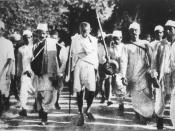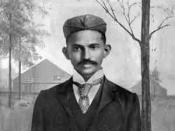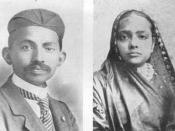Mohandas Karamchand Gandhi is one of the most remembered and respected peace heroes of the 20th Century. During Gandhi's years of working in India and South Africa, he went through humiliating experiences of racial discrimination that propelled him to take a stand. Gandhi's heroic struggles in life set the stage for people like myself to keep the peace when all else fails.
Gandhi's philosophy of keeping peace while acquiring his human rights led to triumphant victories. As Gandhi strove to gain the rights of South Africans, he later went on to lead the movement to free India from the British. His religious beliefs consisted of fasting and praying for results, such as, humility and peace all over the realm without blood being shed. These may have been unusual ambitions and aspirations however the remarkable method Gandhi had sent a non-violent hurricane throughout the nation that everyone wanted to be caught within.
Mohandas' actions were based on the principle of truth and non-violence called "Satyagraha"(Furbee 33). In 1913, Gandhi could have chosen violence but decided to step up the practice of Satyagraha since South Africa Indians were being jailed and killed. Six years later, Gandhi formed a non-violent protest and resistance because Indians were killed by British troops. This shows that Mohandas Gandhi was a man on a mission who would soon achieve civil rights for India and South Africa. Gandhi knew it would be some time before civil liberties were given and sovereignty would be established. He knew that by fasting and praying that peace could be established without having a world war that could have caused massive destruction.
Gandhi's peace-loving philosophy developed more over the course of several years as a reaction to the widespread violence, racial and social divisions (Parekh 59). He promoted non-violence and civil disobedience as...



Nice one
Very well detailed essay some spelling errors but besides that very well done.
0 out of 0 people found this comment useful.